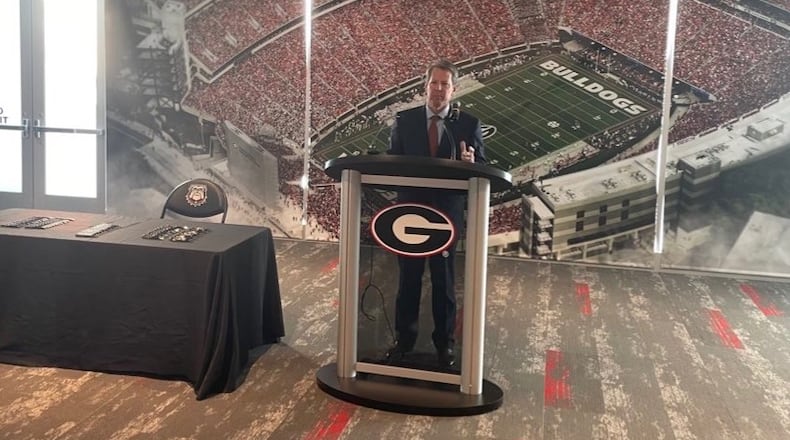Inside a glitzy new recruiting center built into the University of Georgia’s famed football stadium, Gov. Brian Kemp signed a law that challenges a foundation of the multibillion-dollar college sports industry: that student-athletes should earn a degree, not money.
The Republican signed legislation Thursday that paved the way for college athletes to be paid for the use of their name and image, and eventually empower them to hire agents to negotiate contracts. In Kemp’s view, it will help both superstars and bench players benefit.
“It sets Georgia on the path to accomplish something that, quite honestly, should have been done a long time ago,” the governor said. “Simply put, college athletes in Georgia should be fairly compensated for the use of their name, image and likeness.”
There might not be any cash windfall in the near future. Officials say the legislation won’t take effect until the NCAA changes it rules or Congress adopts legislation to allow student compensation. The college sports association has long opposed the idea, worried that it would distract from the focus on coursework.
A pending U.S. Supreme Court case on whether the NCAA violated federal antitrust laws by restricting what college athletes could be paid could help further define the debate.
Under House Bill 617, schools have the option to place compensation that students receive in an escrow account that they couldn’t access until at least a year after graduation or withdrawal. And colleges would have to conduct financial literacy and life skills workshops.
The measure passed with broad bipartisan support, though some critics said students shouldn’t receive payment beyond their scholarships.
That the ceremony took place in UGA’s recruiting lounge in the west end of Sanford Stadium was no accident. The governor, an Athens native and die-hard fan of the Georgia Bulldogs, said he hoped the new law would give coach Kirby Smart an extra edge.
“As an alumni myself, I’m a little biased, but I believe that this is going to give coach Smart every bit of help he needs to bring home the national championship.”
The university has hired the firm of Altius Sports Partners to help it navigate this new territory, joining other SEC schools that have contracted with the Washington-based firm. For now, the school is conducting seminars to educate college athletes about what the changes would mean.
“Certainly, I think where we’re headed, you’ll see more and more states do what Georgia has done today,” said UGA President Jere Morehead, a member of the NCAA’s governing body, “and it wouldn’t surprise me to see a federal solution at some point down the road.”
The legislation, which takes effect in July, puts Georgia in a group of about a dozen other states that have adopted similar laws that pave the way toward a new world of college sports. Supporters say it’s aimed at pressuring the NCAA to make changes it’s long resisted and set up a framework in case the U.S. Supreme Court or Congress acts.
“It’s a good first step,” said state Rep. Chuck Martin, an Alpharetta Republican who sponsored the bill. “It puts Georgia on the leading edge to compensate athletes for the value they bring to the overall system.”
Staff writer Chip Towers contributed to this article.
About the Author
The Latest
Featured




